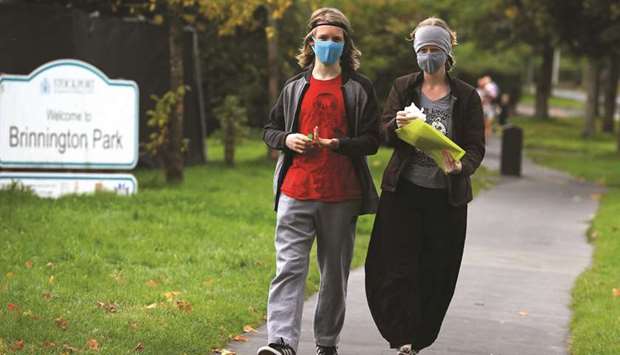Prime Minister Boris Johnson yesterday said he did not want to see a second national lockdown to combat the coronavirus pandemic, saying it would be completely wrong for Britain and be financially disastrous.
“I don’t want a second national lockdown,” he told a parliamentary committee. “I think it would be completely wrong for this country and we are going to do everything in our power to prevent it... I very much doubt that the financial consequences would be anything but disastrous.”
The United Kingdom has recorded nearly 4,000 new daily cases of Covid-19, government data showed yesterday, with the total number of daily cases at its highest level since May 8.
Official stats showed there were 3,991 new positive cases of Covid-19 recorded, compared with 3,105 on Tuesday.
That is the highest daily figure for new cases since May 8, when there were 4,649 new cases reported.
Case numbers have started to increase in recent days but Britain’s testing capacity has also grown since the peak of the first wave of the virus earlier this year.
There were also a further 20 new deaths from Covid-19, according to figures that show fatalities within 28 days of a first positive test.
The prime minister yesterday said his government was working hard to increase testing capacity to tackle the coronavirus pandemic, saying he aimed to be able to do 500,000 tests a day by the end of October.
“We will be up at 500,000 per day by the end of October,” Johnson told a parliamentary committee, adding that he hoped that would be enough to meet increasing demand.
He repeated that the government would hold an inquiry into its handling of the coronavirus crisis, but did not give a time for it. The government promised to do whatever it takes to boost laboratory capacity that has left people across the land with no way to get a Covid-19 test.
The government has in May promised to create a “world-beating” system to test and trace people exposed to the virus.
But repeated attempts by Reuters reporters to get Covid-19 tests failed, while at a walk-in testing centre at Southend-on-Sea in eastern England hundreds of people were queuing to get a test — some from as early as 0500GMT.
“Laboratory capacity has been an issue, we are working our way through that,” Justice Secretary Robert Buckland told Sky News.
“We’ll do whatever it takes to make sure we have that capacity,” he told BBC TV. “We know where the pressure points are, we are piloting new walk-in test centres.”
Health Secretary Matt Hancock said on Tuesday that fixing the system would take weeks.
Buckland said health workers, care home workers and school children and their parents should get priority for tests.
Though Britain’s testing problems are acute, other major European countries have also had hiccups.

People wearing a face covering due to the Covid-19 pandemic, arrive at a novel coronavirus testing centre in Stockport, northwest England, yesterday.
